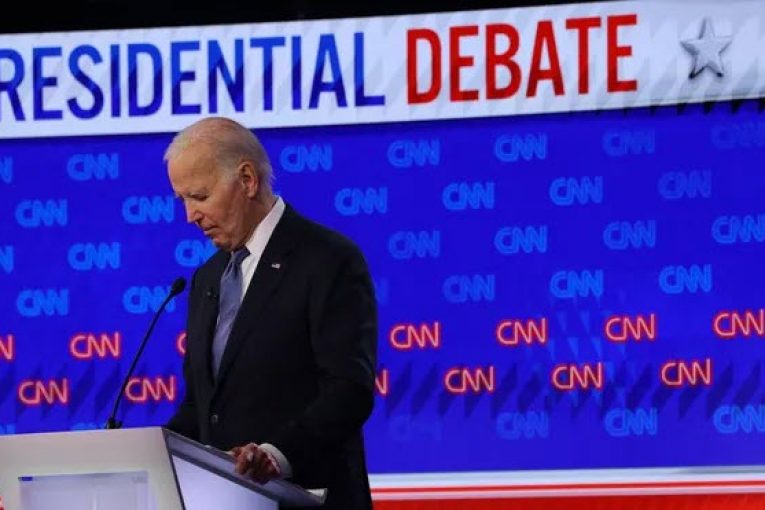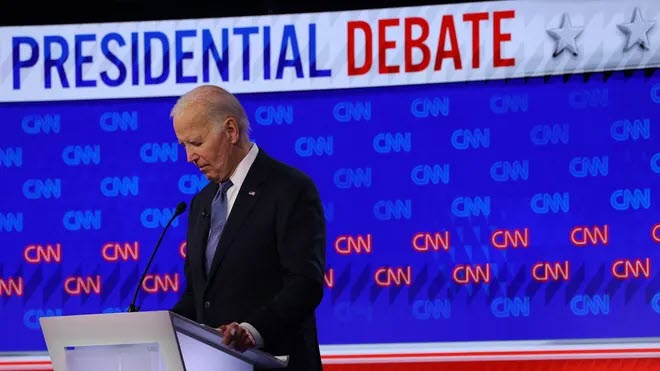

By David M. Greenwald
Executive Editor
On Sunday, President Biden did what a majority of Democrats thought he should do following his disastrous debate a few weeks ago. While it is a stunning development—certainly historically—it seemed that pretty much everyone, at least in his party, thought he needed to do so EXCEPT him.
It was interesting to observe how it all unfolded. The media immediately turned against him following the debate. There was then a slow trickle of calls to bow out of the race. The question was—could he wait out those calls. That was what was particularly interesting to watch—they didn’t slow down and the pressure continued to ratchet up, and donors pulled out. A slow stream of representatives and senators engaged.
By last week, it was becoming clear that the leadership wanted him out. A critical point was reached when Adam Schiff—a close associate and ally of Nancy Pelosi—called for Biden to bow out; we knew that Schiff would not have come forward without her blessing and that possibly he was speaking as her surrogate. While Biden continued to resist, that was probably the straw that broke the impasse.
From here, the process really doesn’t figure to be very difficult despite all sorts of machinations by both the media and the opposition party.
Despite the fact that we have moved to a nomination system that is almost exclusively the prerogative of voters in primaries, and parties ultimately nominate their candidates for the general election, that hadn’t occurred yet. So, Biden has effectively released his  pledged delegates and now the delegations will have the option of selecting the party nominee.
pledged delegates and now the delegations will have the option of selecting the party nominee.
At this point, that looks like a mere formality. Vice President Kamala Harris has formally announced, President Biden, former President Clinton, and former Presidential nominee Hillary Clinton have endorsed, and the most likely formidable challengers like Gavin Newsom and Gretchen Wilmer have declined to seek the nomination.
That leaves a question as to who will be the Vice Presidential nominee and at what point Harris—presuming she is the nominee—will announce her selection.
On an historic level, we are in uncharted territory.
The last time a sitting President was eligible to run for reelection but bowed out was Lyndon Johnson in 1968. He did so, however, much earlier in March, giving time for there to be a primary and nomination process.
1968 may well be the best analogy to 2024—but it is far from perfect.
Johnson bowed out as he became deeply unpopular with the Vietnam War. Like now, the country was bitterly divided. And it was volatile.
In June, just as Robert Kennedy appeared to be wrapping up the Democratic nomination, he was shot and killed. Of course, it was barely a week ago that former President Trump, the Republican nominee was the victim of an assassination attempt.
That might hearken us back to another year—1912. That year, the Republican party was badly split, and former President Theodore Roosevelt took on his successor William Howard Taft, the Democrat was Woodrow Wilson and a fourth candidate, socialist Eugene Debs, got a sizable vote.
With the divided Republican Party, Wilson won, Taft finished a distant third. In October, Roosevelt survived an assassination attempt by John Schrank, a former saloonkeeper, while campaigning for the presidency in Milwaukee.
He was hit in the chest, but the bullet was slowed by his dense overcoat—however, he was seriously injured. Nevertheless, he gave his full scheduled speech, at one point showing the audience the bullet hole and then remarking, famously that “it takes more than that to kill a bull moose.”
Back to 1968, the Kennedy assassination was the second major assassination that year—the first being Martin Luther King on April 4, days after LBJ announced he would not run for a second full term.
The divided Democratic Party went into Chicago, where Vice President Hubert Humphrey emerged as the nominee, but the convention was marred by riots in a nearby park.
Ultimately that election was a nailbiter—but that was because Humphrey closed late when he came out against the war. For most of the election, it looked like Nixon would win easily.
So what is likely to happen in 2024—assuming Harris is the nominee, and all signs point to that now—it appears that it is a close race. Trump was in many respects well ahead of Biden, especially in the electoral college. The thinking was that Biden, damaged by concerns about age and his mental acuity was almost certain to lose.
I would suggest people not look at the polls for a few weeks because there is basically a reset and a lot of noise. There could be an initial bump and rally effect for Harris. But really, until the campaign resets to normal, it will be extremely difficult to judge things.
As Nate Silver said yesterday, “They’re probably still underdogs against Trump, but Biden dropping out improves their odds.”
That’s probably true—but not certainly true. The dynamics of the race have definitely been altered and that should make for some interesting observing in the coming weeks.


Election reboot with Kamala? Really?
Without getting into a long term judgment… yes. The entire political landscape has shifted somewhat. Whether that’s permanent or temporary – yes it happened.
I’m saying it from the perspective that Kamala only received 1% of the Democrat primary vote when she ran for President, even democrats didn’t like her. Biden only selected her because he promised his Vice President would either be a female or a person of color, not based on her merit. Now somehow she’s being “selected” again to be the Democrat’s choice to run for President? She has no accomplishments and her ratings were lower than Biden’s for most of the last three years. So “really?”
Kamala, selected, not elected.
MAGA saw a political opportunity and did the classic political flip flop. Previously you insisted he drop out and now you are preventing him from dropping out. Make up your fricken minds. MAGA = Clowns. Christofascism at its finest.
Not elected anyway, it’s a nomination. The election is in November.
Not bad especially considering the short notice.
MAGA election interference gets taken to the dumpster.
Black Lives Matter slams Democrats for ‘anointing’ Kamala Harris without primary vote
https://wcyb.com/news/nation-world/black-lives-matter-slams-democrats-for-anointing-kamala-harris-without-primary-vote-blm-host-a-virtual-primary-to-determine-who-should-receive-the-partys-nomination-ahead-of-the-democratic-national-convention
It seems like every election cycle America gets a civics lesson. In past years, Americans learned that voters don’t elect the president, the electoral college does. This year, we learn that primaries don’t select nominees, parties do through their convention delegates. Here endeth the lesson.
Harris called out Trump for being a serial liar and once again for making crazy comments.
Harris Claps Back at Trump on Antisemitism Claim: ‘Doug’s Literally Jewish’
“Tonight, Donald Trump couldn’t pronounce words, insulted the faith of Jewish and Catholic Americans, lied about the election (again), lied about other stuff, bragged about repealing Roe, proposed cutting billions in education funding, announced he would appoint more extremist judges, revealed he planned to fill a second Trump term with more criminals like himself, attacked lawful voting, went on and on and on, and generally sounded like someone you wouldn’t want to sit near at a restaurant—let alone be President of the United States,” campaign spokesperson James Singer said in a statement.
“America can do better than the bitter, bizarre, and backward looking delusions of criminal Donald Trump. Vice President Kamala Harris offers a vision for America’s future focused on freedom, opportunity, and security.”
https://www.thedailybeast.com/kamala-harris-campaign-bites-back-at-trump-over-jewish-jab